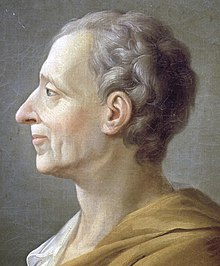
Back Charles Montesquieu Afrikaans Charles de Secondat, Baron de Montesquieu ALS Montesquieu AN مونتسكيو Arabic مونتيسكيو ARZ Montesquieu AST Şarl Lui Monteskyö Azerbaijani مونتسکیو AZB Шарль де Монтескьё Bashkir Шарль Луі дэ Мантэск’ё Byelorussian
Montesquieu | |
|---|---|
 Portrait by an anonymous artist, c. 1753–1794 | |
| Born | 18 January 1689 Château de la Brède, La Brède, Aquitaine, France |
| Died | 10 February 1755 (aged 66) Paris, France |
| Spouse |
Jeanne de Lartigue (m. 1715) |
| Children | 3 |
| Era | 18th-century philosophy |
| Region | Western philosophy |
| School | Enlightenment Classical liberalism |
Main interests | Political philosophy |
Notable ideas | Separation of state powers: executive, legislative, judicial; classification of systems of government based on their principles |
| Signature | |
Charles Louis de Secondat, Baron de La Brède et de Montesquieu (French pronunciation: [ʃaʁl lwi də səɡɔ̃da baʁɔ̃ də la bʁɛd e də mɔ̃tɛskjø]; 18 January 1689 – 10 February 1755), generally referred to as simply Montesquieu (US: /ˈmɒntəskjuː/,[1] UK also /ˌmɒntɛˈskjɜː/,[2] French: [mɔ̃tɛskjø]), was a French judge, man of letters, historian, and political philosopher.
He is the principal source of the theory of separation of powers, which is implemented in many constitutions throughout the world. He is also known for doing more than any other author to secure the place of the word despotism in the political lexicon.[3] His anonymously published The Spirit of Law (1748), which was received well in both Great Britain and the American colonies, influenced the Founding Fathers of the United States in drafting the U.S. Constitution.
- ^ "Montesquieu" Archived 21 November 2014 at the Wayback Machine. Random House Webster's Unabridged Dictionary.
- ^ Wells, John C. (2008). Longman Pronunciation Dictionary (3rd ed.). Longman. ISBN 978-1-4058-8118-0.
- ^ Boesche 1990, p. 1.